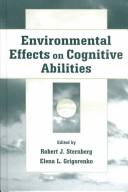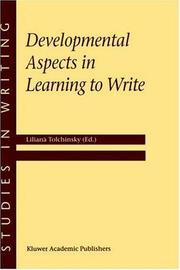| Listing 1 - 4 of 4 |
Sort by
|

ISBN: 0155080644 9780155080645 9780805860887 0805860886 Year: 2001 Publisher: Fort Worth : Harcourt College Publishers,
Abstract | Keywords | Export | Availability | Bookmark
 Loading...
Loading...Choose an application
- Reference Manager
- EndNote
- RefWorks (Direct export to RefWorks)
Bell et al’s Environmental Psychology is considered to be the most authoritative textbook available for this course. It is the only environmental psychology book to appear in five editions. It is noted for its focus on the application of science and theory to the solution of problems involving natural and altered environments. The book reviews the application of practical solutions to everyday environmental problems. The authors integrate theory, research, and application using their unifying, eclectic model to demonstrate human-environment interaction. The book reviews how we are a product of our environment, our biology, and the interaction of the two. It discusses how our physical environment such as noise and weather impact us. It also reviews how we can modify our environment through design principles such as aesthetics, and how we modify our environment when we disregard the impact other people and/or elements have on our ecological system. Each chapter addresses both micro and macro- environmental influences, including the short- and long-term effects of both. The opening chapter provides a historical context and introduces the reader to the research methods central to the discipline. The next 4 chapters introduce environmental attitudes, values, and ethics and the principles that apply to environmental assessment; models of perception & cognition, including how we process and store environmental information; and the major theories of human-environment interaction. The next 6 chapters explore a variety of environmental influences such as noise, climate, natural disasters (including the effects of pollution), crowding, and city life, and how they impact us. The next 2 chapters examine how environmental psychology principles can be applied to residences, institutional settings (i.e.schools) and work and leisure environments. The book concludes with a chapter on how we can change behavior that harms the environment. The book is intended as a text for courses on environmental psychology, environment and behavior, social ecology, architectural psychology, ecological psychology or environmental design or studies, taught in departments of psychology, sociology, environmental science, and biology.
#KVHB:Omgevingspsychologie. Zie ook: Wonen --- #KVHB:Milieu --- Environmental psychology --- Cognitive ergonomics --- Ecological psychology --- Ecopsychology --- Ecotherapy --- Environmental quality --- Environmental social sciences --- Human factors science --- Psychoeology --- Psychology --- Psychotherapy --- Ecological Systems Theory --- Psychological aspects --- Psychologie de l'environnement

ISBN: 1410612317 9781410612311 9780805831832 0805831835 9781135671136 9781135671174 9781135671181 9780415647526 1135671176 Year: 2001 Publisher: Mahwah, N.J. : L. Erlbaum Associates,
Abstract | Keywords | Export | Availability | Bookmark
 Loading...
Loading...Choose an application
- Reference Manager
- EndNote
- RefWorks (Direct export to RefWorks)
It sometimes seems that it is difficult to pick up a current newspaper or a magazine without it containing a story about some behavioral characteristic for which it has been found that a gene is responsible. Even aspects of behavior that one would feel certain are environmentally controlled are now being attributed in part to the effects of the genes. But genes never act alone: Their effects are always filtered through the environment. The goal of this volume is to discuss how the environment influences the development and the maintenance of cognitive abilities. It is a successor to
Intellect. --- Nature and nurture. --- Environmental psychology. --- Cognitive ergonomics --- Ecological psychology --- Ecopsychology --- Ecotherapy --- Environmental quality --- Environmental social sciences --- Human factors science --- Psychoeology --- Psychology --- Psychotherapy --- Ecological Systems Theory --- Environment --- Genetics and environment --- Heredity and environment --- Nature --- Nature versus nurture --- Nurture and nature --- Genetics --- Heredity --- Human beings --- Human intelligence --- Intelligence --- Mind --- Ability --- Thought and thinking --- Psychological aspects --- Nurture --- Effect of environment on --- Environment and genetics --- Environment and heredity

ISBN: 0805831835 Year: 2001 Publisher: Mahwah, NJ ; London : Lawrence Erlbaum Associates,
Abstract | Keywords | Export | Availability | Bookmark
 Loading...
Loading...Choose an application
- Reference Manager
- EndNote
- RefWorks (Direct export to RefWorks)
#PBIB:2002.2 --- Environmental psychology --- Intellect --- Nature and nurture --- Environment --- Genetics and environment --- Heredity and environment --- Nature --- Nature versus nurture --- Nurture and nature --- Genetics --- Heredity --- Human beings --- Human intelligence --- Intelligence --- Mind --- Ability --- Psychology --- Thought and thinking --- Cognitive ergonomics --- Ecological psychology --- Ecopsychology --- Ecotherapy --- Environmental quality --- Environmental social sciences --- Human factors science --- Psychoeology --- Psychotherapy --- Ecological Systems Theory --- Nurture --- Effect of environment on --- Psychological aspects --- Environment and genetics --- Environment and heredity --- Contexte environnemental --- Intelligence -- developpement --- Processus cognitif --- Intellect. --- Nature and nurture. --- Environmental psychology. --- Intelligence. --- Hérédité et milieu. --- Psychologie de l'environnement.

ISBN: 0792369793 0792370635 9401007349 Year: 2001 Publisher: Dordrecht Kluwer Academic
Abstract | Keywords | Export | Availability | Bookmark
 Loading...
Loading...Choose an application
- Reference Manager
- EndNote
- RefWorks (Direct export to RefWorks)
Developmental Perspectives on Writing LILIANA TOLCHINSKY University of Barcelona, Spain The advent of the sixties is considered a crucial moment for the discovery of writing as an object worthy of intellectual inquiry (Havelock, 1986). A number of books, which came out in that decade, set the stage for this turn-to-writing. One of them was the Preface to Plato by Eric Havelock. This book, published in 1963, was to become a milestone in the discovery of literacy as a field of research (Bockheimer, 1998). Havelock (1986) referred to three more works that came out at the same time, and Bockheimer suggested adding other publications; for example La pensee sau vage by Levi Strauss (1962); The consequences of literacy by Jack Goody and Ian Watt (1963) and La geste et la parole by Laroi -Gourham (1964/65). The authors of these books were anthropologists, philosophers and sociologists who coincided in highlighting the significance of writing for human development and, more specifically, for language development. They maintained that many insti tutions, ideas, beliefs, opinions and convictions of the Western world were a by product of an 'alphabetized mind'. Writing was for them one of the pillars of subjec tivity, responsible for the rise of consciousness, for our conception of words and for our notion of true and false. Amazingly linguists, psycho linguists, psychologists and educators did not participate in the turn-to-writing. The firstl, did not give any atten- 1 There were some exceptions to this generalization.
Children --- Child development. --- Skrivinlärning. --- Writing. --- Language. --- Psycholinguistics --- Developmental psychology --- Didactics of languages --- Clinical psychology. --- Cross-cultural psychology. --- Community psychology. --- Environmental psychology. --- Clinical Psychology. --- Cross Cultural Psychology. --- Community and Environmental Psychology. --- Cognitive ergonomics --- Ecological psychology --- Ecopsychology --- Ecotherapy --- Environmental quality --- Environmental social sciences --- Human factors science --- Psychoeology --- Psychology --- Psychotherapy --- Ecological Systems Theory --- Psychology, Applied --- Social psychology --- Cross-cultural psychology --- Ethnic groups --- Ethnic psychology --- Folk-psychology --- Indigenous peoples --- National psychology --- Psychological anthropology --- Psychology, Cross-cultural --- Psychology, Ethnic --- Psychology, National --- Psychology, Racial --- Race psychology --- National characteristics --- Psychiatry --- Psychological tests --- Psychological aspects
| Listing 1 - 4 of 4 |
Sort by
|

 Search
Search Feedback
Feedback About
About Help
Help News
News